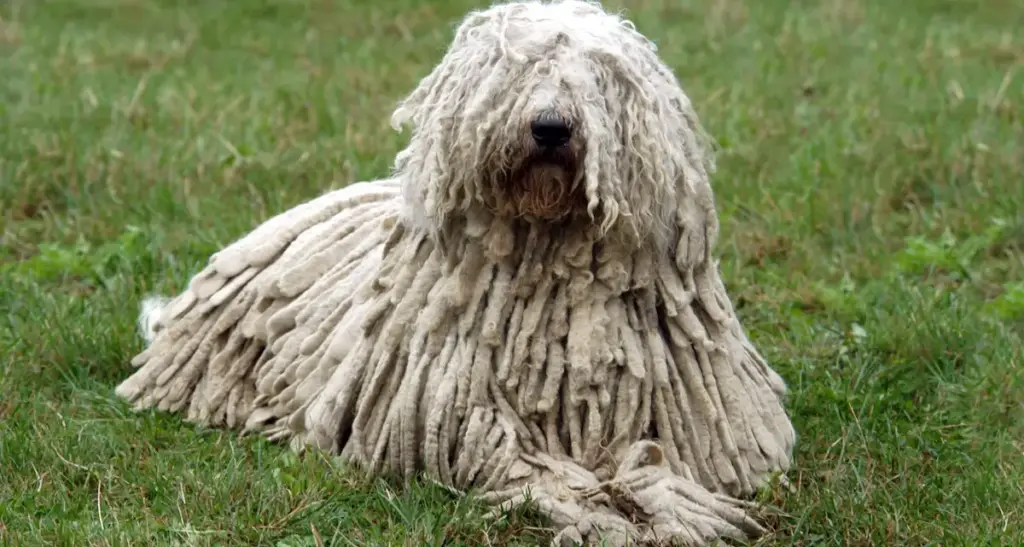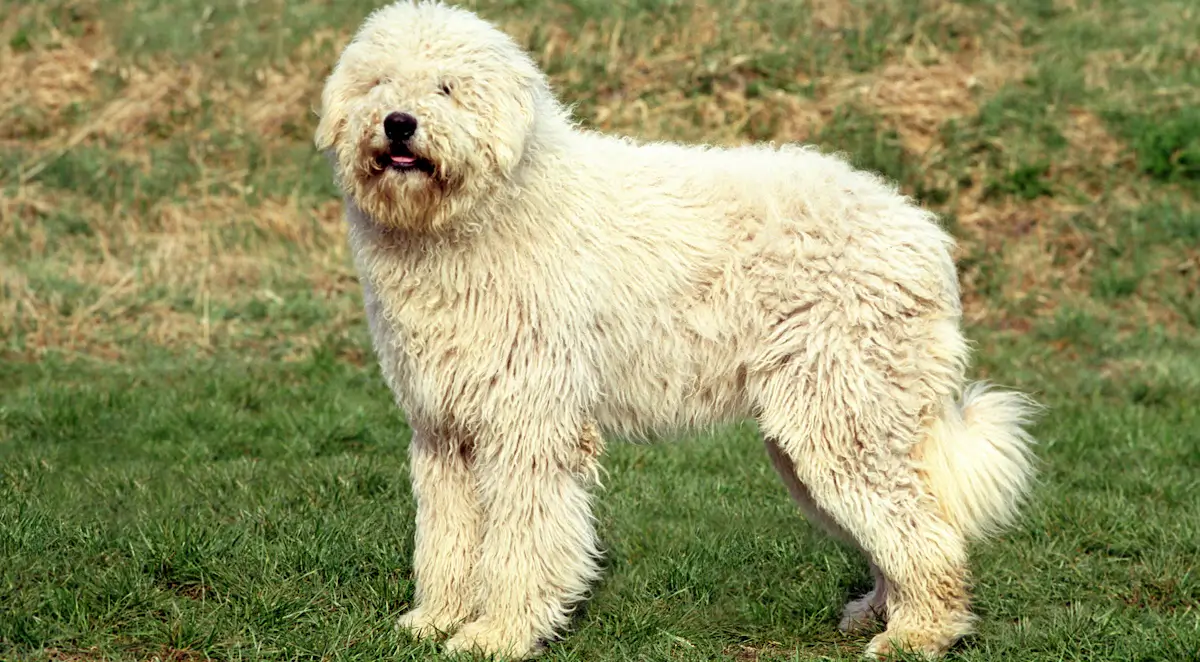Like a sentinel cloaked in white, the Komondor stands guard, its corded coat symbolizing its ancient protective instincts. You’ve likely seen this majestic breed and marveled at its unique appearance, but beyond the striking facade lies a dog of considerable capabilities and specific needs.
With a history steeped in the Hungarian plains, the Komondor was bred for more than just its aesthetics—its presence was a deterrent to predators and intruders. As you consider the role of this vigilant guardian in modern settings, you’ll uncover layers of temperament ranging from fiercely loyal to surprisingly tender, particularly within the family unit.
Despite their seemingly laid-back demeanor when at rest, you’ll find that owning a Komondor comes with challenges and responsibilities, especially regarding their grooming needs and exercise. Are you prepared to uncover what lies beneath those captivating cords, and is the Komondor the right companion for your lifestyle?
The answers may surprise you as we explore the depths of this breed’s character.
- Noise Level
- Energy
- Sociability
- Trainability
- Care
- Health
Overall
Summary
The Komondor is a breed known for its moderate noise level, high energy, sociability, and care needs. They require moderate training efforts and tend to be healthy overall, making them suitable for dedicated owners seeking a loyal and protective companion.
Komondor: Traits, Temperament, and Care Guide
When considering the Komondor as a loyal guardian, it’s crucial to understand that their protective instinct is hardwired, necessitating early socialization to harness their innate vigilance effectively.
As a livestock guardian, the Komondor exhibits a calm, steadfast temperament. However, their potential for hip dysplasia should be noted, emphasizing the need for exercise to stay healthy.
The breed’s dense cords require meticulous coat care to prevent matting, particularly during the biannual shedding of their undercoat.
Training is essential not just for obedience but also to manage their territorial nature and tendency to bark.
Exploring the Characteristics of the Komondor
Delving into the characteristics of the Komondor reveals a breed with a commanding presence, characterized by a muscular build and a distinctive, corded white coat that effectively camouflages it among sheep. As a guard dog, the Komondor’s white coat isn’t merely for show; these cords protect against predators while guarding livestock. This coat requires significant grooming to prevent matting and to maintain health.
Early and consistent socialization is crucial to tempering the Komondor’s territorial instincts. It fosters a sense of belonging within the family while keeping them wary of strangers. The Komondors’ loyalty and protective nature make them unparalleled protectors of their domain.
Here is a snapshot of the Komondor’s characteristics:
| Feature | Detail |
|---|---|
| Origin | Danube basin, descended from Aftscharka |
| Size & Weight | Large stature; 80-100 lbs |
| Protective Nature | Fiercely protective; requires socialization |
| Health Care | High grooming needs; watch for health issues |
Komondor: A Comprehensive Profile and Guide
As you consider bringing a Komondor into your home, it’s essential to understand the comprehensive profile of this unique breed. Their historical role as flock guardians has shaped their behavior, resulting in a protective dog that requires a firm, experienced handler.
Addressing their complex coat care and space needs is paramount to ensuring the well-being of this breed.
Everything You Need to Know
Understanding the Komondor breed requires an appreciation of its unique, corded coat, which is both a defining feature and a considerable grooming commitment. As you consider a Komondor puppy, remember:
- Socialization: Early and consistent socialization is crucial, ensuring your Komondor is well-adjusted and behaves appropriately around strangers and other pets.
- Health Management: Regular veterinary check-ups can help detect common large breeds’ health problems, including genetic eye issues, ensuring a longer, healthier life.
- Exercise Needs: Despite their size, Komondors need daily exercise to maintain their physical and mental well-being, appropriate for guarding Hungarian livestock.
Your dedication to understanding these aspects is paramount, as is your commitment to integrating this guardian into your life, ensuring the iconic white cords of this breed remain a symbol of protection and companionship.
Discovering the Temperament
Beneath their calm exterior, Komondors possess a vigilant temperament, ready to immediately spring into action and protect their loved ones. As a guardian breed, historically used to protect flocks of sheep, they exude high energy and require regular mental and physical stimulation. To ensure a well-adjusted demeanor, ongoing socialization is crucial; adult Komondors must be accustomed to various scenarios to prevent excessive wariness of strangers.
This breed’s temperament is anchored in loyalty and a sharp instinct to guard. Despite their size and strength, they’re affectionate with family, demonstrating a protective nature without needless aggression. Komondors are intelligent and capable of discerning threats, ensuring that their protective instincts are well-channeled and their trust well-placed.

Komondor: Is It a Good Fit for Families?
As you consider a Komondor for your family, it’s crucial to analyze whether this breed’s protective nature aligns with your household’s needs. It would be best to weigh the breed’s demand for space and grooming against its capacity to form strong familial bonds, particularly with children.
Additionally, the necessity for early socialization to mitigate aggressive tendencies towards outsiders should be a decisive factor in your choice.
Assessing Komondor’s Compatibility with Families and Kids
When assessing the Komondor’s role in family dynamics, it’s essential to recognize that while they can form strong bonds and act as vigilant protectors for children within their household, their inherent wariness of strangers necessitates careful supervision around visiting youngsters.
To ensure a harmonious relationship between the Komondor and a family with children, consider these key factors:
- Need Early Socialization: Komondors must be socialized from a young age to foster acceptance of familiar faces and new encounters.
- Large Dog, Securely Fenced Yard: These large dog breeds require ample space—a securely fenced yard is non-negotiable to contain their robust physiques and spend time exerting energy safely.
- Commitment to Maintenance: Pet parents must be prepared to regularly keep them clean, as their distinctive coats demand thorough and frequent care.
Komondor Climate Versatility
With its dense, corded coat, the Komondor exhibits remarkable adaptability to various climates, from the chill of frosty terrains to the warmth of sun-bathed landscapes. As one of the large dogs, its heavy coat acts as an insulator against harsh weather, enabling it to excel in cold conditions.
Despite their large size and heavy coat, Komondors tolerate heat, though you’ll need to provide ample shade and water to prevent health conditions. Its white color can reflect sunlight, aiding in keeping it cool.
The breed’s protective nature in urban or rural settings ensures it thrives as a guardian, regardless of climate. However, care must be taken to keep it clean and watch for eye problems, especially in dusty or bright environments.
Komondor Obedience Essentials
Regular exercise is crucial for a Komondor’s health, demanding a securely fenced area for adequate movement and play to satisfy their physical needs. As part of this dog breed’s regimen, you must allocate significant time to their exercise and grooming needs. Interaction with housemate dogs, perhaps at a dog park, can supplement their activity level and foster a sense of belonging.
However, their distinctive cords necessitate meticulous grooming. This involves cleaning to maintain the dogs’ skin health and preventive measures against parasites. Routine bathing, while labor-intensive, is indispensable to prevent odor and ensure their white coat remains pristine. Neglect could result in mats that require surgical correction, underscoring the importance of consistent grooming practices for your Komondor’s well-being.
You must establish your alpha role to ensure control during obedience training with a Komondor.
Early and consistent socialization is pivotal to mitigate their inherent territorial aggression.
Utilizing various training methods will maintain your Komondor’s interest and prevent independent behaviors from undermining your efforts.
Effective Training Strategies
Effective training strategies are crucial for shaping the Komondor, a breed known for its independence and protective instincts, into a responsive and obedient guard dog. As a Komondor owner or someone considering a Komondor, it’s important to remember that dog training is a commitment that requires consistency and patience. Obedience training classes can provide a structured environment where your Komondor can learn alongside others, enhancing their socialization.
| Training Aspect | Importance for Komondors | Considerations for Owners |
|---|---|---|
| Consistency | Prevents confusion | Set clear rules |
| Socialization | Reduces aggression | Expose to various stimuli |
| Positive Reinforcement | Encourages good behavior | Reward desired actions |
Well-suited to effective training strategies, remember to keep them neat and systematic, ensuring your Komondor understands what is expected. This analytical approach will help forge a strong bond based on mutual respect and understanding.
Exercise and Grooming Needs

Health Considerations
You must be aware of the common health issues that can affect Komondors, including joint disorders like hip and elbow dysplasia and ocular conditions.
Their lifespan typically ranges between 10 and 12 years, with vigilant care crucial to mitigating potential health problems.
As a Komondor owner, you must prioritize consistent veterinary check-ups, dental care, and weight management to support their overall health and longevity.
Common Health Issues and Lifespan
Komondors generally enjoy a lifespan of 10-12 years, but they’re susceptible to certain health conditions such as hip and elbow dysplasia, various eye problems, and require diligent dental care to prevent oral issues.
The American Kennel Club has recognized the Komondor as a Hungarian guard dog for its distinctive appearance and protective nature. Yet, common health issues prevalent in large breeds also affect them.
Proactive monitoring for signs of joint dysplasia is vital, particularly as Adult Dogs. Early detection and management can maintain a Healthy and Happy life.
Ensure regular vet check-ups to screen for eye problems like entropion and cataracts. Additionally, they prioritize their dental hygiene to ward off potential complications.
Is Komondor the Right Dog for You?
Assessing whether a Komondor aligns with your lifestyle and environment is crucial before considering this distinctive guard dog as a new family member. As one of the large breeds, a Komondor requires ample space and won’t thrive in a cramped apartment. They need time for daily exercise and plan to take the dog out for significant daily activity to maintain their well-being.
Analyze your disposition toward dogs with a protective instinct and consider if you’re prepared for the appearance of the Komondor, which demands regular grooming. If you’re committed, looking into a shelter or rescue for adoption could be rewarding. Remember, choosing a Komondor means accepting a noble heritage, and all rights reserved to the breed’s needs must be honored.
Alternatives for Komondor: Unique and Protective Large Guardian Breeds
Explore these breeds if you appreciate the Komondor’s unique appearance and protective nature, perfect for those who value distinctive and vigilant large guardian dogs.
| Similar Dogs | Short Description |
|---|---|
| Puli | Known for its unique corded coat, intelligent and active, strong herding instincts. |
| Old English Sheepdog | Known for its shaggy coat and gentle, adaptable nature. |
| Briard | Long, flowing coat, known for its loyalty and protective instincts. |
| Tibetan Mastiff | Impressive presence, known for its loyalty and protective nature. |
Conclusion
The Komondor isn’t just another drop in the bucket when choosing a pet; this breed is a standout guardian and companion.
Your commitment to its exercise and complex grooming needs and a clear understanding of its protective temperament is paramount.
Vigilant about its health and obedient training will ensure your Komondor thrives.
Reflect deeply before welcoming this noble breed into your fold to ensure a harmonious match.
